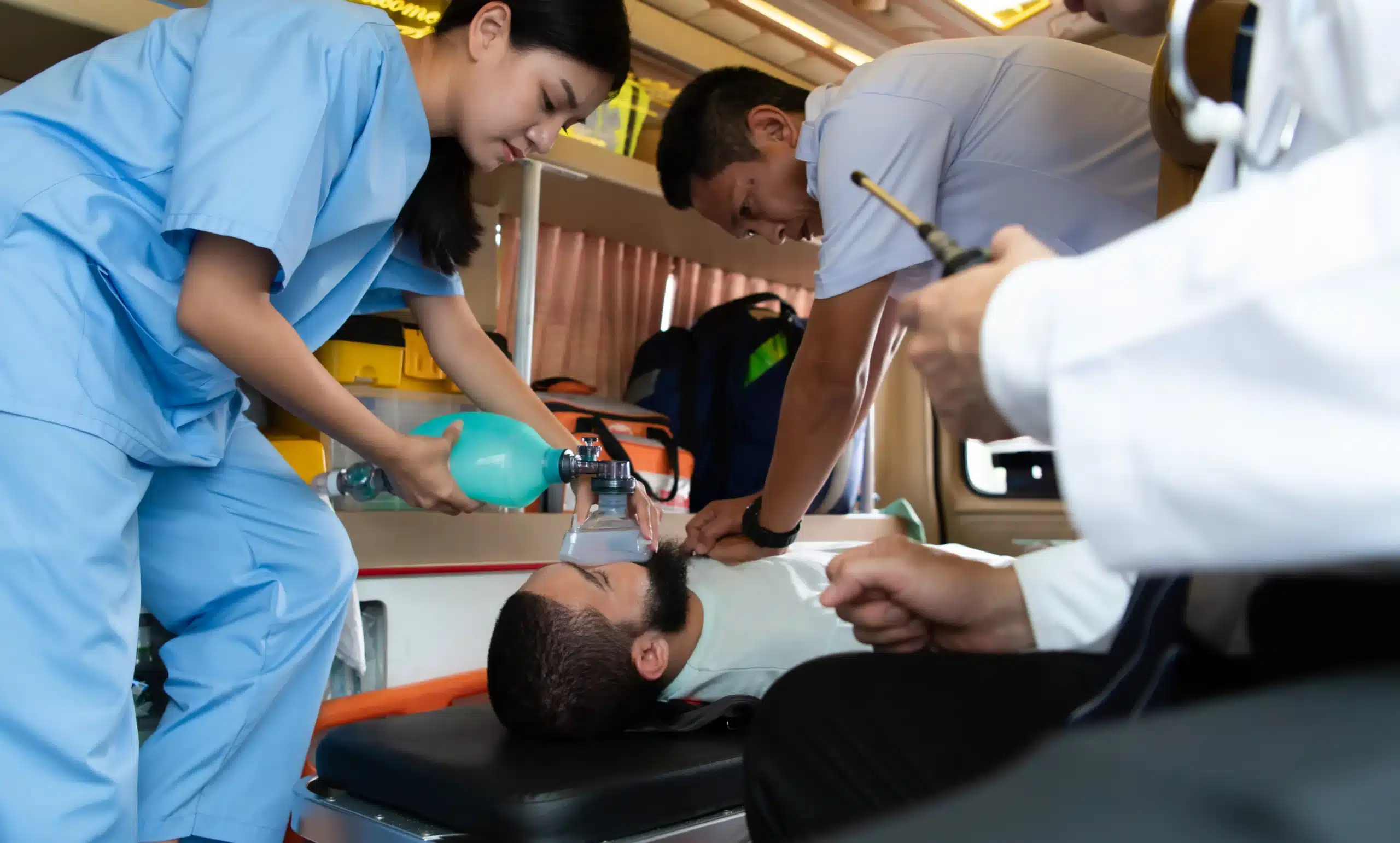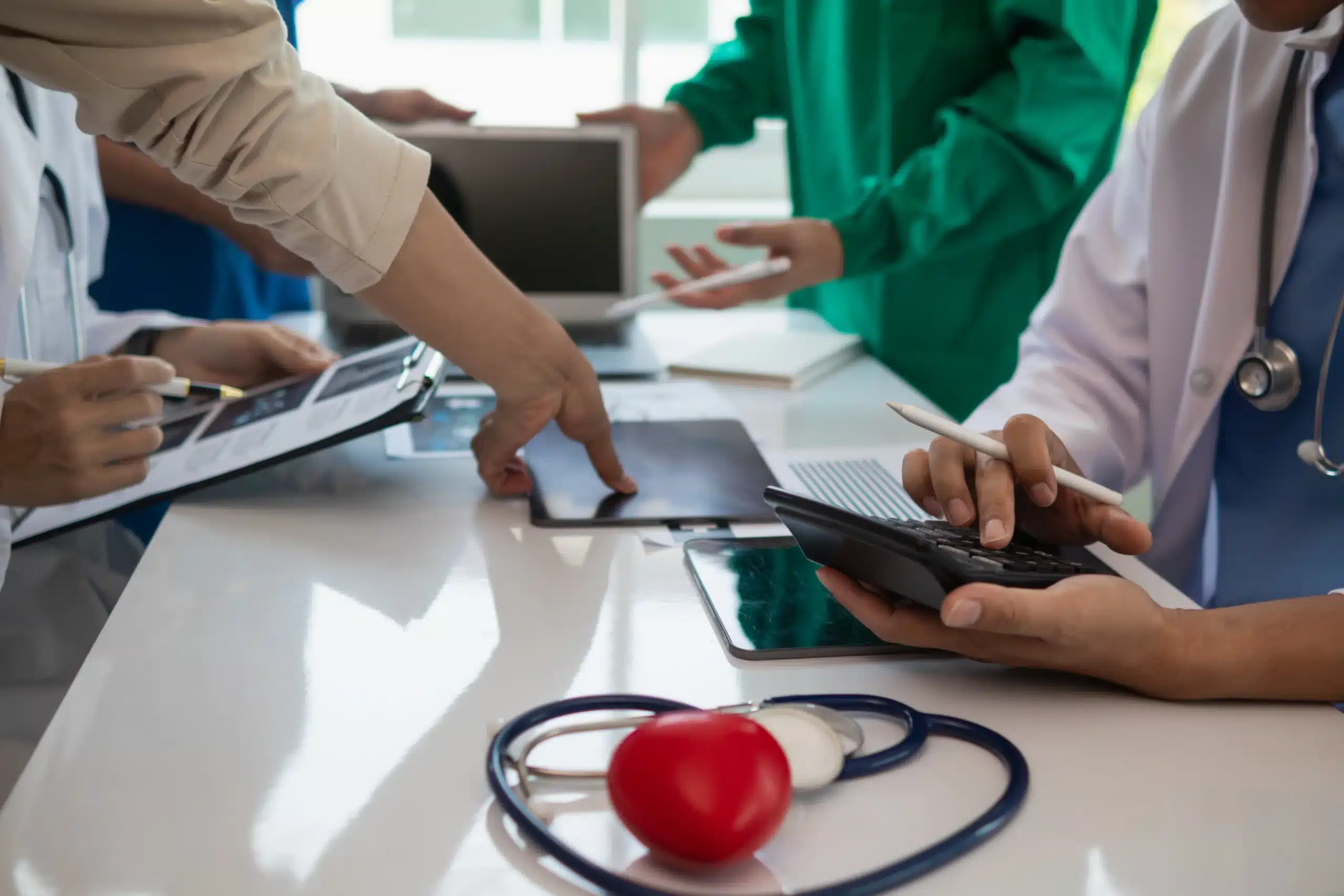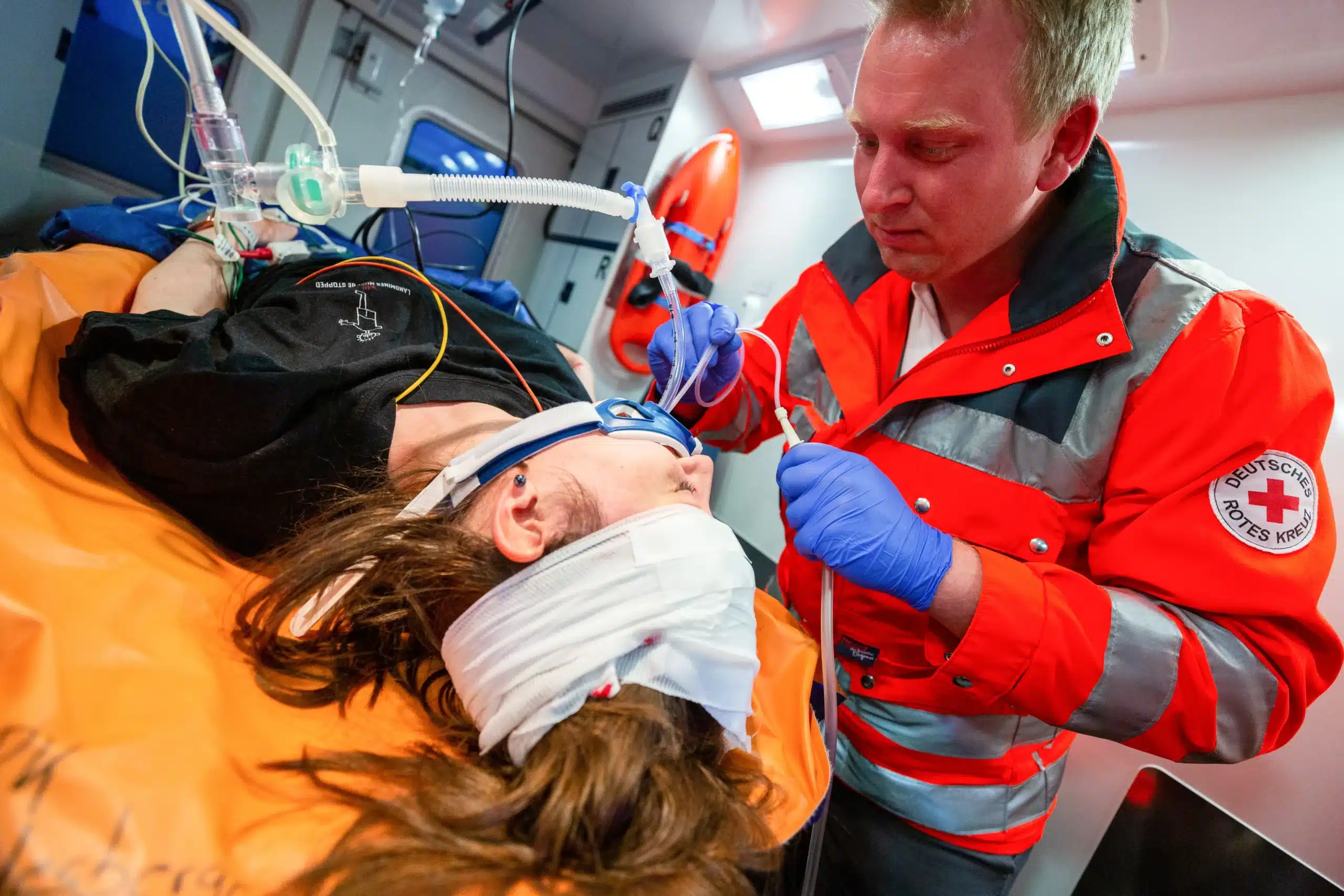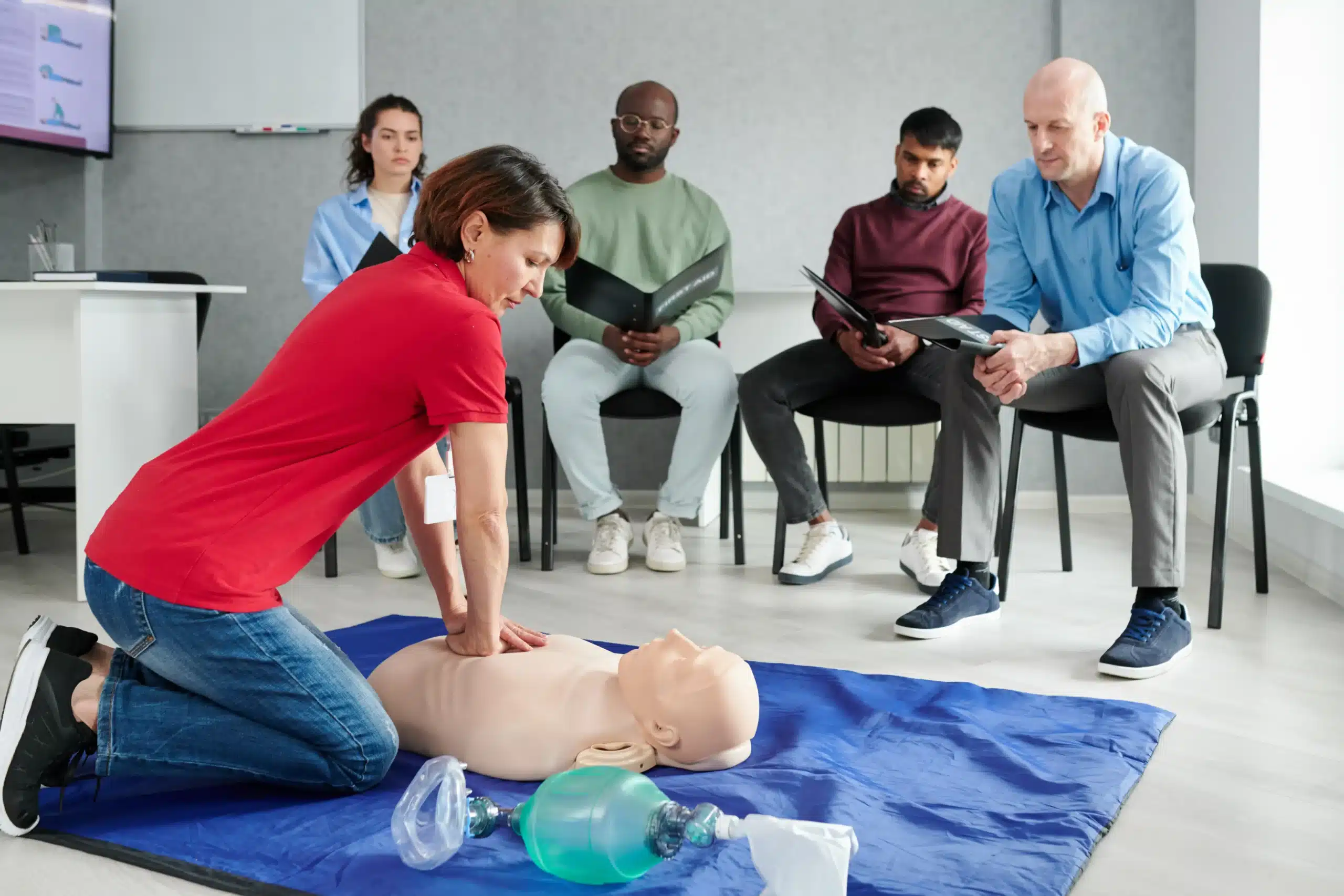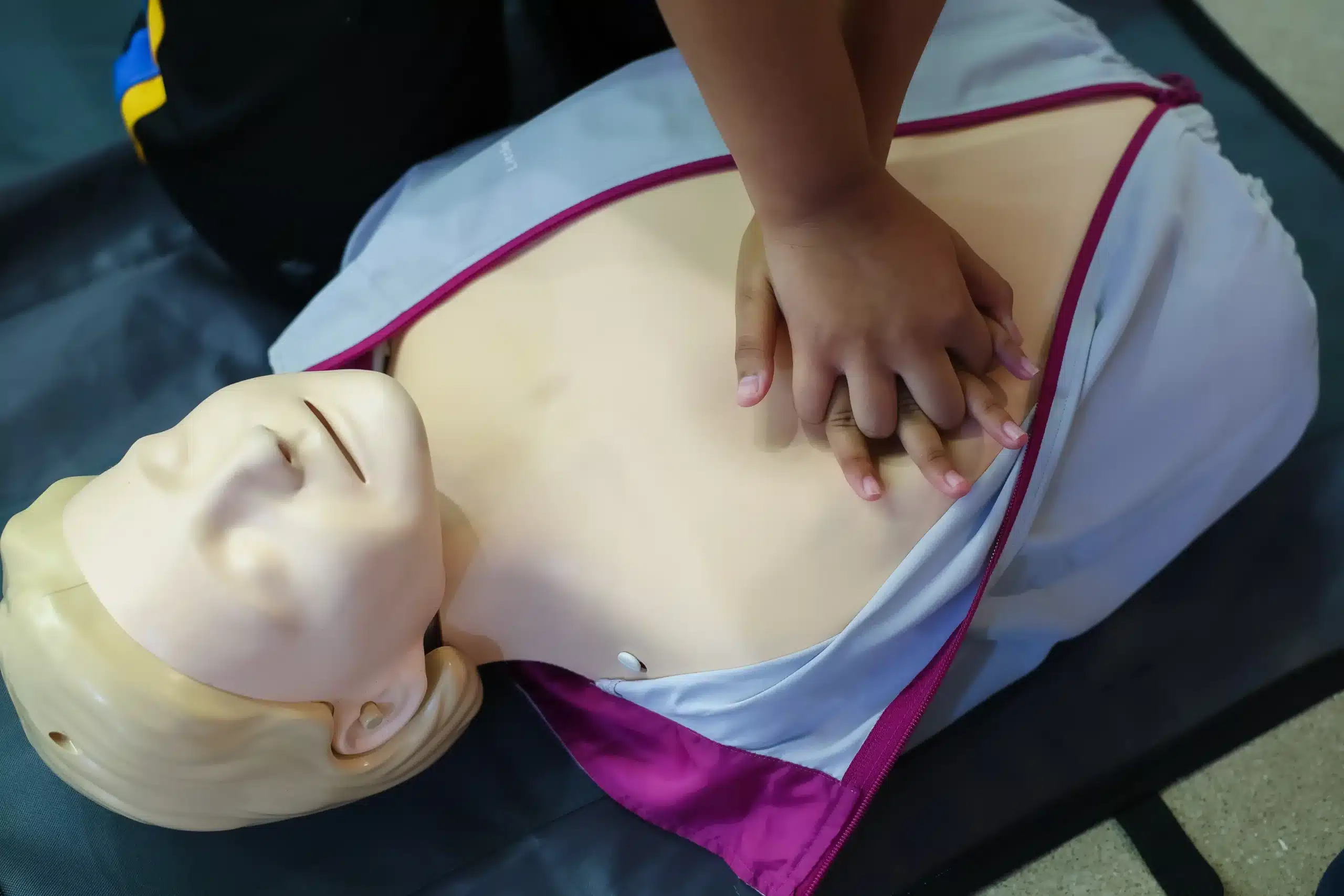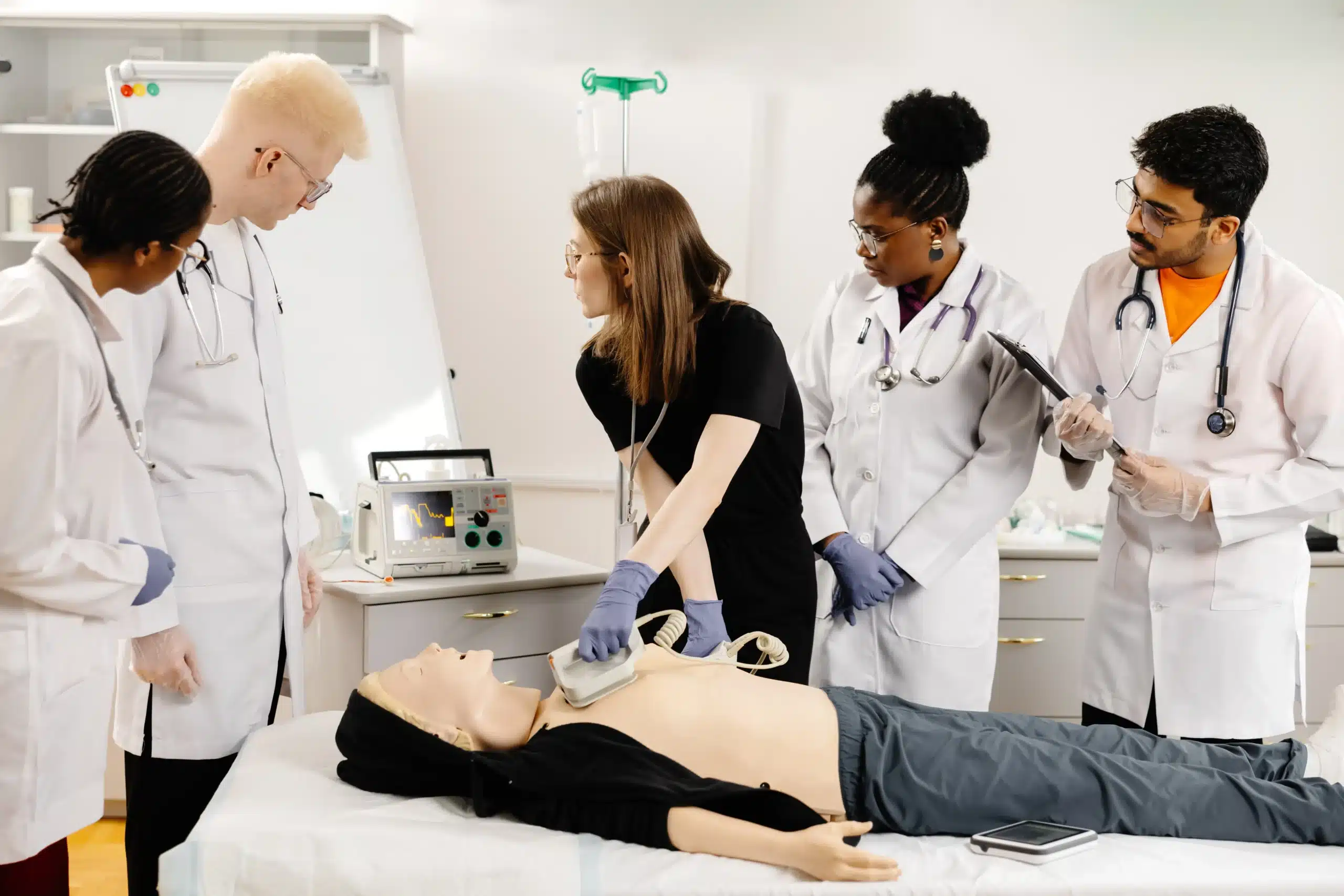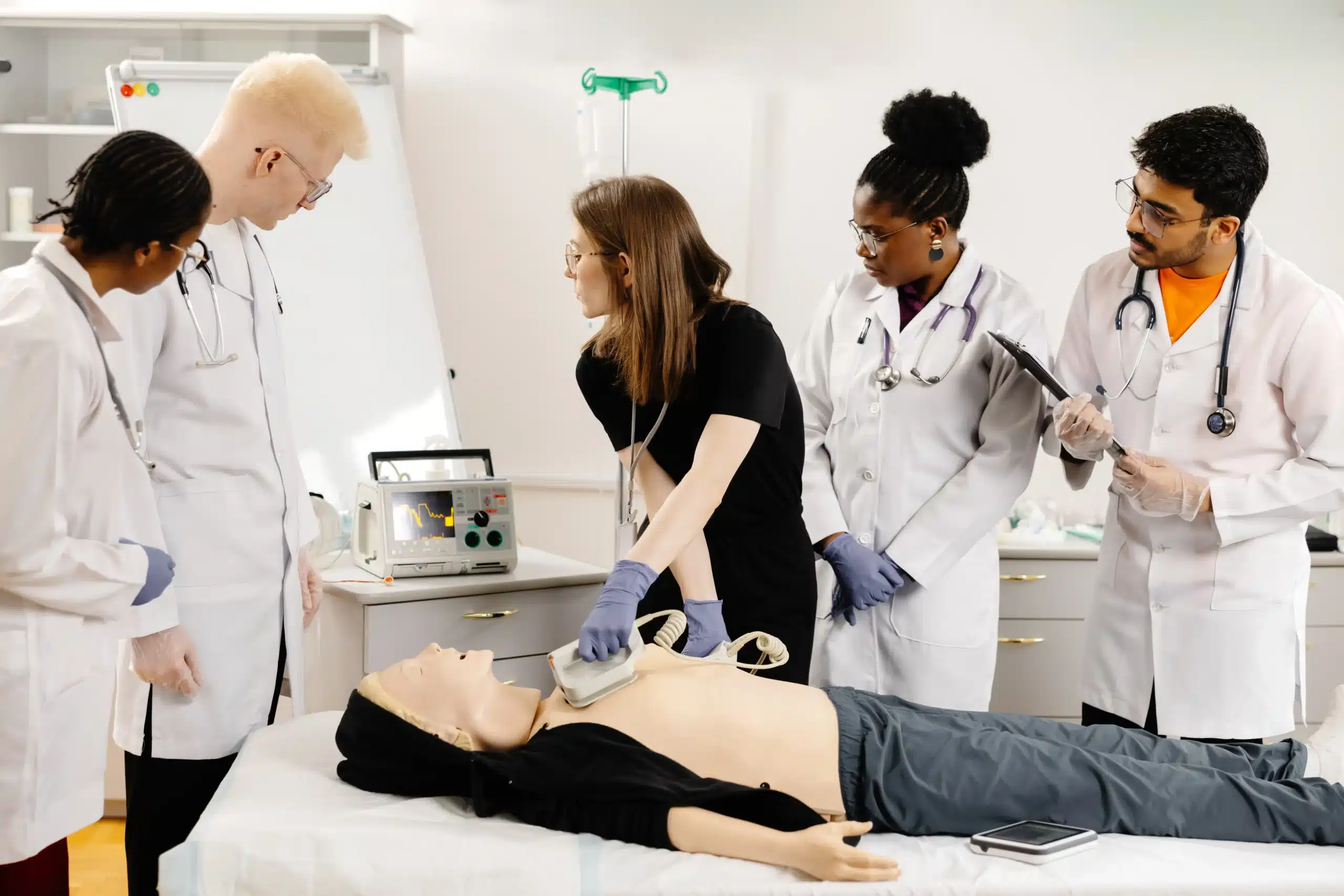Empower yourself to make a difference in your community with first-aid training in Fairfield. These courses provide the skills and confidence to respond effectively to medical emergencies, big or small. From treating minor injuries to providing life-saving care, first-aid training is an invaluable asset for everyone. This post explores the different types of first-aid courses available in Fairfield, including CPR certification, basic life support (BLS), and advanced cardiovascular life support (ACLS). We’ll discuss the benefits of getting certified, how to choose the right course for your needs, and the costs involved. We’ll also address common challenges to accessing training and provide resources to support your learning journey.
Key Takeaways
- First-aid skills are essential for everyone: Learning first aid equips you to handle a wide range of medical situations, from minor injuries to life-threatening emergencies. Explore the variety of courses available in Fairfield, including CPR, BLS, ACLS, and PALS, to find the best fit.
- Select the right course based on your needs: Consider factors like course format, certification requirements, and your specific goals when choosing a first-aid program. Look for providers offering flexible schedules, group discounts, and courses tailored to specific industries or situations.
- Stay current with your first-aid knowledge: Maintaining your certification and refreshing your skills are crucial for effective emergency response. Regularly review course materials, practice hands-on scenarios, and consider continuing education opportunities to keep your skills sharp.
What is First-Aid Training in Fairfield?
First-aid training in Fairfield gives you the skills to handle medical emergencies. Think of it as your toolkit for responding to everything from minor cuts and burns to more serious situations. These courses teach practical skills and build confidence so you can act quickly and effectively when it matters most. Several organizations in Fairfield offer a variety of first-aid courses, including CPR training, how to use an AED, and specialized training for groups like childcare providers and healthcare professionals. Whether you’re a parent, teacher, or just want to be prepared, first-aid training is a valuable asset. It empowers you to make a real difference in critical situations and contribute to a safer community. You can explore CPR, BLS, ACLS, PALS, and first-aid courses in Fairfield.
First-Aid Courses Available
This section covers the various first-aid courses available in Fairfield, CA, to help you choose the training that best suits your needs.
CPR Certification
CPR certification gives you the skills to respond to cardiac arrest and breathing emergencies. CPR Education offers CPR, AED, and First Aid training in Fairfield, working with families, individuals, and businesses. Learning CPR empowers you to help adults, children, and infants during life-threatening situations.
Basic Life Support (BLS)
Basic Life Support (BLS) certification is essential for healthcare professionals and anyone involved in medical emergencies. The American Heart Association RQI program is a popular option for medical professionals in Fairfield to obtain their AHA BLS certification. This program emphasizes high-quality CPR and continuous improvement in resuscitation techniques.
Advanced Cardiovascular Life Support (ACLS)
Advanced Cardiovascular Life Support (ACLS) builds on BLS skills, focusing on advanced life-saving techniques for adults experiencing cardiac arrest or other cardiovascular emergencies. Safety Training Seminars offers ACLS courses in Fairfield, designed for healthcare providers managing these types of emergencies. The training covers airway management, rhythm recognition, and effective team dynamics.
Pediatric Advanced Life Support (PALS)
Pediatric Advanced Life Support (PALS) certification is key for healthcare providers working with infants and children. Safety Training Seminars also provides PALS training in Fairfield, giving professionals the skills to respond to pediatric emergencies. This course covers respiratory distress, shock management, and post-resuscitation care.
General First Aid
General first-aid courses teach you to handle various injuries and illnesses, from minor cuts and burns to more serious issues like fractures and allergic reactions. The American Red Cross offers comprehensive first-aid training in Fairfield, equipping you with the knowledge to help during emergencies. This training benefits everyone, regardless of profession.
Choose the Right First-Aid Course
Finding the right first-aid course is the first step. With several options available, consider your specific needs and what each course offers. This section will guide you through the process.
Assess Your Needs
Before signing up for a class, think about why you want first-aid training. Are you pursuing it for personal knowledge, or is it a job requirement? Do you need it to become a healthcare provider? For example, workplace safety regulations often mandate specific certifications. Understanding your goals will help you choose the best fit.
Course Duration and Format
First-aid courses vary in format and length. Some are traditional, in-person classes led by an instructor, while others offer blended learning, which combines online learning with in-person skills sessions. Consider your learning style and schedule when making your decision. The American Red Cross offers a range of options for their first aid/CPR/AED program.
Certification Requirements
Ensure the course you choose meets the necessary requirements. Check if the certification aligns with any workplace or regulatory standards you need to meet. Adams Safety Training in Fairfield, for example, highlights that their certifications meet state and federal requirements. For those pursuing healthcare careers, research programs like the American Heart Association’s RQI program, a popular option for medical professionals seeking BLS, ACLS, and PALS certifications.
Target Audience
Many first-aid courses are designed for specific groups. Some focus on healthcare providers, while others cater to the general public, including teachers, childcare providers, and community members. CPR and first-aid classes in Fairfield often serve a diverse audience. Providers like CPR Education may offer specialized training for families, individuals, and businesses. Choosing a course designed for your background can make the learning experience more relevant.
First-Aid Training Costs in Fairfield
Knowing the price range for first-aid training can help you budget and choose the right course. Fairfield offers various options, so understanding the factors influencing cost is essential.
Course Prices
First-aid course prices in Fairfield, like elsewhere, depend on several factors. A basic CPR course, which often includes AED training, typically starts around $45, as reported by some Yelp reviews of local providers. More comprehensive courses that combine CPR and first aid certification can range from $50 to $150. Advanced certifications, such as those for healthcare professionals, can cost upwards of $200. Remember that prices can vary, so check with specific training centers like Vacaville CPR Classes for their current pricing. They even offer a low-price guarantee.
Group & Corporate Discounts
If you need to train a group of employees or colleagues, explore group discounts. Many providers, including Vacaville CPR Classes, offer reduced rates for group training. This can be a cost-effective way to ensure your team has the necessary first-aid skills. These group courses are typically interactive and engaging. Contact providers directly to discuss your group’s needs and any potential discounts.
Student & Senior Discounts
Students and seniors may also be eligible for discounts on first-aid training. While not universally offered, it’s worth inquiring. Check directly with training centers in Fairfield or explore options like Vacaville CPR Classes, which offers student discounts to make training more accessible. This can make learning these essential life skills more affordable.
Benefits of First-Aid Certification
Getting certified in first aid isn’t just about checking a box; it’s about equipping yourself with skills that can make a real difference. Whether you’re a parent, teacher, or just someone who wants to be prepared, the advantages are numerous.
Learn Life-Saving Skills
First-aid certification gives you the practical skills to respond effectively in emergencies. You’ll learn how to assess injuries, control bleeding, perform CPR, and provide basic care until professional help arrives. These skills can be the difference between life and death. SkillsYouNeed emphasizes how first-aid training provides essential knowledge and builds competence in providing medical assistance, empowering you to take action when it matters most. Our comprehensive first-aid certification courses cover these life-saving skills in detail.
Gain Confidence in Emergencies
Imagine facing a medical emergency. Would you feel confident and prepared to help? First-aid training not only teaches you the necessary skills but also instills the confidence to use them. USCPR Online highlights how CPR and first-aid certification build this essential confidence for effective medical treatment. Knowing you can handle a crisis brings peace of mind to your daily life.
Improve Career Prospects
In many professions, first-aid certification is a valuable asset. Employers often look for candidates with these skills, especially in fields like healthcare, education, and childcare. Incline Magazine notes that first-aid certification is a sought-after skill, particularly when working with vulnerable populations. This qualification on your resume can open doors to new opportunities.
Contribute to Community Safety
First-aid training empowers you to be a more active and helpful member of your community. You’ll be prepared to assist in emergencies, from car accidents to medical crises at community events. Group training strengthens community preparedness and can save lives. Consider our group discount options to make training more accessible for your organization or community group. By getting certified, you become a valuable resource and contribute to a safer environment.
First-Aid Training Providers in Fairfield
Finding the right first-aid training provider is crucial for a positive learning experience. Here’s a rundown of some reputable options in Fairfield:
Safety Training Seminars
Safety Training Seminars is a woman-owned American Heart Association (AHA) Training Center. They offer a comprehensive range of courses, including BLS, ACLS, PALS, CPR, and first-aid training. A major plus is their commitment to convenience, with courses offered daily in Fairfield and surrounding areas. Learn more about their CPR and first-aid certification courses.
CPR Education
CPR Education focuses on equipping families, individuals, and businesses with essential CPR, AED, and first-aid skills. They offer flexible training options, often conducting on-site classes for businesses while also catering to individuals and families. Explore their Fairfield first-aid and CPR/AED training.
American Red Cross
The American Red Cross is a well-known provider of first-aid classes. Their courses cover essential emergency response skills and are offered at various times and locations to accommodate different schedules. The Red Cross combines expert instruction with hands-on training for a comprehensive learning experience. Note: Double-check the location, as some search results may show Fairfield, NJ, instead of Fairfield, CA. If you are looking for Red Cross training in California, you may need to broaden your search.
Thompson Safety
Thompson Safety prioritizes workplace safety, offering first-aid, CPR, and AED training that helps businesses meet OSHA requirements. Their four-hour in-person courses prepare participants to handle various workplace incidents.
Adams Safety Training
Adams Safety Training is an approved training center by the California Emergency Medical Services Authority (EMSA). They provide CPR, BLS, AED, and first-aid training, ensuring all certifications meet state and federal requirements.
What to Expect in Your First-Aid Training
Knowing what to expect can help you feel prepared and confident going into your first-aid training. Here’s a breakdown of what your course will likely entail:
Course Formats: In-Person vs. Online
First-aid courses are offered in several formats. In-person classes, like those offered by Safety Training Seminars, provide a structured learning environment with direct interaction with an instructor. This format allows for immediate feedback and answers to any questions. Blended learning, combining online modules with an in-person skills session, offers more flexibility. You can work through the online portion at your own pace and then demonstrate your skills in person. The American Red Cross offers both classroom and blended learning options. Consider your learning style and schedule when selecting a format.
Hands-on Practice and Skills Assessment
Hands-on practice is a critical part of first-aid training. You’ll learn essential skills like CPR, wound care, and how to respond to various medical emergencies. These courses, often available in Fairfield, usually take just a few hours to complete. Expect to participate in simulated scenarios to apply what you’ve learned in a safe and controlled setting. This practical experience builds your confidence and prepares you to react effectively in real-life situations. Small class sizes allow for personalized instruction and plenty of opportunities to practice your skills.
Certification Process
After successfully completing your training, you’ll receive certification, typically valid for two years. This certification demonstrates your competency in providing first-aid care. Organizations like the American Heart Association also offer programs like RQI (Resuscitation Quality Improvement) that provide healthcare professionals with certifications such as BLS, ACLS, and PALS. Remember to keep track of your certification expiration date and renew it to maintain your skills and credentials.
Maintain Your First-Aid Certification
Once you’ve earned your first-aid certification, staying current is key. Knowing the renewal process and how to keep your skills sharp will ensure you’re always prepared to help in an emergency.
Renewal Requirements
First-aid certifications typically expire after two years. Check your certification card for the exact expiration date. Safety Training Seminars offers AHA certification cards valid for two years. Don’t let your certification lapse—sign up for a renewal course before it expires to avoid any gaps in your qualification.
Continuing Education
Continuing education is a great way to stay on top of the latest first-aid practices. RQI classes offer a streamlined approach to maintaining your BLS, ACLS, and PALS certifications. These programs often combine online learning with in-person skills assessments and same-day card issuance, making it convenient to update your credentials.
Retain Your Skills
A current certification is essential, but so is keeping your skills fresh. Regularly review the material you learned in your first-aid course. Even simple refreshers can dramatically increase your confidence and ability to respond effectively under pressure. Consider practicing scenarios with friends or family to solidify your knowledge and build muscle memory. This hands-on practice will help you remain calm and act quickly when it matters most.
Address First-Aid Training Challenges
Let’s face it: finding the right first-aid training can sometimes feel overwhelming. From scheduling conflicts to cost concerns, several common challenges can make it tricky. This section tackles those roadblocks head-on, offering practical solutions to help you get the training you need.
Accessibility and Scheduling
One of the biggest hurdles to first-aid training is often simply finding a class that fits your schedule. Work, family, and other commitments can make attending a traditional weekday course difficult. Look for providers like Vacaville CPR Classes, offering flexible scheduling—including evening and weekend classes—to accommodate busy lifestyles. Extended hours can also make training more accessible. For example, Safety Training Seminars’ courses, running from 8 am to 10 pm, seven days a week, provide ample opportunity to find a time that works for you.
Training Quality
Not all first-aid courses are created equal. The quality of your training directly impacts your ability to respond effectively in an emergency. Seek out programs taught by certified and experienced instructors who emphasize hands-on practice. Organizations like the American Red Cross are known for their focus on practical skills development. They also often provide resources for ongoing learning, ensuring you stay up-to-date.
Course Relevance
Finding a course relevant to your specific needs is crucial. A healthcare provider requires different training than a childcare worker or a construction worker. Consider your profession and the types of emergencies you’re most likely to encounter. Specialized courses tailored to specific industries or situations can provide the most relevant and valuable training.
Cost Considerations
Cost is a valid concern for many seeking first-aid training. Prices can vary depending on the course type, provider, and location. While some basic CPR courses may be relatively affordable, more advanced certifications can be more expensive. Explore options like group discounts or payment plans to make training more budget-friendly. Also, check if your employer offers reimbursement for first-aid training, which can significantly offset the cost.
First-Aid Training Resources and Support
Knowing what resources are available before, during, and after your first-aid training can make a real difference in how well you learn and retain these essential skills. From pre-course materials to online platforms and expert instructors, support is available every step of the way. This extra support can make a big difference in your confidence level.
Pre-Course Materials
Getting ready for your first-aid class can be as simple as gathering a few key items. For example, some providers, like Fairfield CPR Classes, offer a free keychain CPR training mask on the day of the course. This handy tool enhances the learning experience and gives you a practical resource to carry with you. Check with your chosen provider about their pre-course materials to feel more comfortable and confident going into your training.
Online Learning Platforms
Many organizations now offer blended learning options, combining online study with in-person skills sessions. The American Red Cross, for instance, offers its First Aid/CPR/AED program in both traditional classroom settings and a blended learning format. This approach often features online simulation learning, allowing you to learn at your own pace before practicing your skills in person. This flexibility is a great option for busy schedules.
Expert Instruction
Learning from experienced instructors is a cornerstone of effective first-aid training. Look for courses taught by experts who combine lectures with hands-on training. This balanced approach ensures you grasp both the theoretical knowledge and the practical skills necessary to respond effectively in real-life emergencies. Choosing a provider known for its experienced instructors can significantly impact your learning.
Post-Course Support
After completing your first-aid training, continued access to resources can help you retain what you’ve learned. Many organizations, including the American Red Cross, provide online resources and refresher materials. These tools allow you to review key concepts and refresh your skills periodically, ensuring you’re always prepared to act. This ongoing support is invaluable for maintaining your confidence and competence in first aid.
Related Articles
- Online CPR Classes in Fairfield: Your Certification Guide – Vacaville CPR Classes
- CPR Certification in Dixon: Your Comprehensive Guide – Vacaville CPR Classes
- CPR Certification in Vacaville: Your Complete Guide – Vacaville CPR Classes
- BLS CPR Classes in Vacaville, CA – Vacaville CPR Classes
- AHA ACLS Classes in Vacaville, CA – Vacaville CPR Classes
Frequently Asked Questions
What’s the difference between CPR and first-aid training? CPR focuses specifically on life-saving techniques for cardiac arrest and breathing emergencies. First aid covers a broader range of injuries and illnesses, from minor cuts to more serious situations. Often, you’ll find courses that combine both CPR and first aid.
How do I choose the right first-aid course in Fairfield? Think about why you need the training. Is it for personal knowledge, a job requirement, or something else? Consider the course length, format (in-person or blended learning), and if the certification meets any required standards. Also, look for courses designed for your specific background – healthcare provider, teacher, general public, etc.
How much does first-aid training cost in Fairfield? Costs vary depending on the course type and provider. Basic CPR/AED courses can start around $45, while more comprehensive CPR/first-aid courses range from $50 to $150. Advanced certifications like ACLS and PALS for healthcare professionals are typically more expensive. Look for providers offering group, student, or senior discounts.
What can I expect during a first-aid course? Expect a mix of instruction and hands-on practice. You’ll learn essential skills like CPR, wound care, and how to handle different medical emergencies. You’ll likely participate in simulated scenarios to apply what you’ve learned. Most courses lead to a certification, usually valid for two years.
How do I maintain my first-aid certification after completing a course? Most certifications are valid for two years. You’ll need to take a recertification course before it expires. Stay up-to-date with the latest guidelines and best practices by pursuing continuing education opportunities and regularly reviewing the material you learned in your initial course. Practicing your skills will also help you stay sharp and confident.
